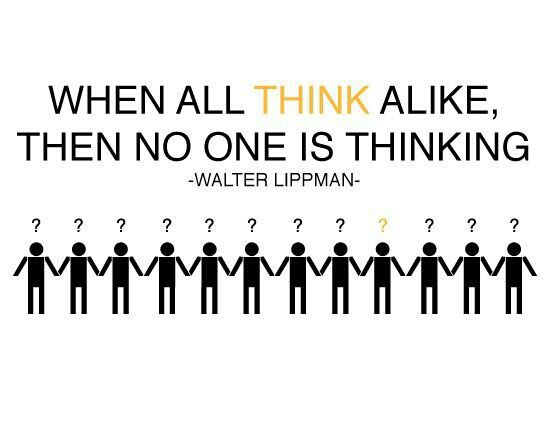We’ve all heard the saying “two heads are better than one,” but how true is this statement? A study was conducted to see if two heads was indeed better than one, in which two participants were asked to work together or on their own to make a decision about visual images. They began alone and had to pick the image that contained the target (a lot like where’s Waldo). If the participants gave different answers they had to discuss who gave the right answer and collaborate. Their joint decision was then compared to their original work and it was concluded that two heads were in fact better than one when the participants were able to effectively communicate. However, it only applies when participants are able to discuss their different perspectives openly but when one person shares flawed information it can lead to negative consequences (Kanai & Banissy, 2010). There are also additional conditions that can effect group decision making.
In 1972, a Yale psychologist named Irving Janis developed a new theory called “groupthink.” Groupthink is the process of flawed decision making that occurs as a result of strong pressures among group members to reach agreement (Schneider, 2012). History has proven how dangerous groupthink can be when certain conditions apply. One example is the Challenger disaster. On January 28, 1986 NASA sent seven crew members, including a schoolteacher from New Hampshire, to their death. Under time pressure and a directive leadership the shuttle was instructed to launch even after warnings of freezing temperatures (Schneider, 2012).
Some conditions in which Janis believes groupthink will occur is when there is high group cohesiveness, directive leadership, high stress, or when the group is isolated from outsiders. High group cohesiveness happens when group members try to fit in by conforming to group norms and individuals lose the ability to think for themselves (Frenz, 2016). A directive leader often doesn’t allow for alternative solutions, what they say goes. High stress happens when a decision puts pressure on the group so they base their decision on the first available option. When a group is isolated from outsiders they are isolated from additional outside sources and information that can used to make a better decision.
There are ways to reduce or prevent groupthink. Leaders play a huge role in a group’s success or failure so it’s important that they examine all relevant information and don’t rush into anything. When used efficiently, two heads is always better than one.
Reference
Frenz, R. (2016). Small Business . Retrieved from Advantages & Disadvantages of Group Cohesiveness & Productivity: http://smallbusiness.chron.com/advantages-disadvantages-group-cohesiveness-productivity-25046.html
Kanai R. & Banissy M. (2010). Scientific American. Retrieved from Are Two Heads Better Than One? It Depends: https://www.scientificamerican.com/article/are-two-heads-better-than/
Schneider, F. W., Gruman, J. A., and Coutts, L. M. (2012). Applied Social Psychology: Understanding and Addressing Social and Practical Problems (2nd ed). Thousand Oaks, CA: Sage Publications.





It can definitely lead to disastrous consequences if a members begin to just go along with anything and blindly follow norms without first evaluating what effects these actions can have in the long run. I believe a certain level of cohesiveness and adherence to group norms is important to ensure a positive and productive work environment but when these factors are taken to the extreme, it is easy to see how the team can end in failure. Assertiveness and decisiveness is needed as part of a group dynamic to ensure groupthink does not occur. That way people openly discuss their perspective despite whether or not it goes along with what everyone else is saying or doing. This helps with the diversity of ideas within the group and can actually result in a better handling of the objective at hand. Agreeing as a team is needed to move forward but if people are willing to discuss their ideas openly and respectfully, the team as a whole can learn different ways of doing things or develop a process geared toward each member’s strengths. I really enjoyed reading your post cause it serves as a good reminder that teams come together not just to complete tasks but also to bring differing viewpoints together. Having an individual identity also allows for checks and balances within the group when it comes to roles and the tasks themselves.
This is a problem I think about a lot. Although, as you say, the received wisdom is that two heads are better than one, I often find in my own work environment that putting too many people on a problem simply causes stagnation. There are many “committees” tasked with tacking certain initiatives and projects, and I’ve found that, as often as not, these committees slow down the realization of these goals rather than speed it up. Your post goes a long way to explore why this might happen. Other researchers have identified “wishful thinking” as a threat when groupthink sets in. Bad information–in the form of hoping that things are going well, even if thy are not–becomes more easily spread and accepted in certain kinds of groups (Benabou, 2013). As you note, the best way to combat tendencies like this is for the group to allow–even encourage–dissent (Benabou, 2013). Annoying as it might be, the guy who is always questioning every decision is doing a great service to any team, because this kind of dissent ensures that the group’s thought processes do not become automatic, too homogeneous, and flawed.
Bénabou, R. (2013). Groupthink: Collective delusions in organizations and markets. The Review of Economic Studies, 80(2), 429.
Great post. You make a lot of really interesting points about groupthink. This is a very serious problem that can hurt the overall benefits of an otherwise diverse team. It is important to foster an environment where it is encouraged to question decisions and push team members to defend their decisions. Conflict within a group is healthy and promotes team growth. As you mentioned, groupthink is not only unproductive, it can also have far greater consequences.